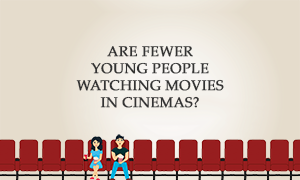 Last Wednesday, I gave a talk to 90 teenagers as a part of the Into Film festival. This annual festival is a free, UK-wide “celebration of film & education for 5-19-year-olds” which holds screenings, workshops and lectures in cinema screens. I will cover Into Film in more detail in a future post so today I wanted to look at a topic that came up in my conversations with the teenagers and festival organisers.
Last Wednesday, I gave a talk to 90 teenagers as a part of the Into Film festival. This annual festival is a free, UK-wide “celebration of film & education for 5-19-year-olds” which holds screenings, workshops and lectures in cinema screens. I will cover Into Film in more detail in a future post so today I wanted to look at a topic that came up in my conversations with the teenagers and festival organisers.
I was dismayed to learn that some of the teenagers at Into Film events had never been inside a cinema before. This isn’t statistically unlikely, it just differs so much from my memories of being a teenager that I wasn’t expecting it. I spent as much time in cinemas as possible, with the highlight of the year being National Cinema Day when all movies were £1 and I would watch five movies in a day. The idea that teenagers only know about filmed content from watching it on television or, worse still, their phones, was disappointing.
In past articles, I have discussed the changing demographics of film audiences but last week’s talk has spurred me on to look specifically at how cinema-going is changing for younger people.
Young people in American and Canadian cinemas
Our first port of call is to look at the data the MPAA collects on the demographics of people buying cinema tickets in the US and Canada. Using their data means we are defining “young people” as those aged between 12 and 24 years old.
As shown below, there has been a decline between 2009 (when young people bought 34% of cinema tickets) and 2016 (when they bought 29%).
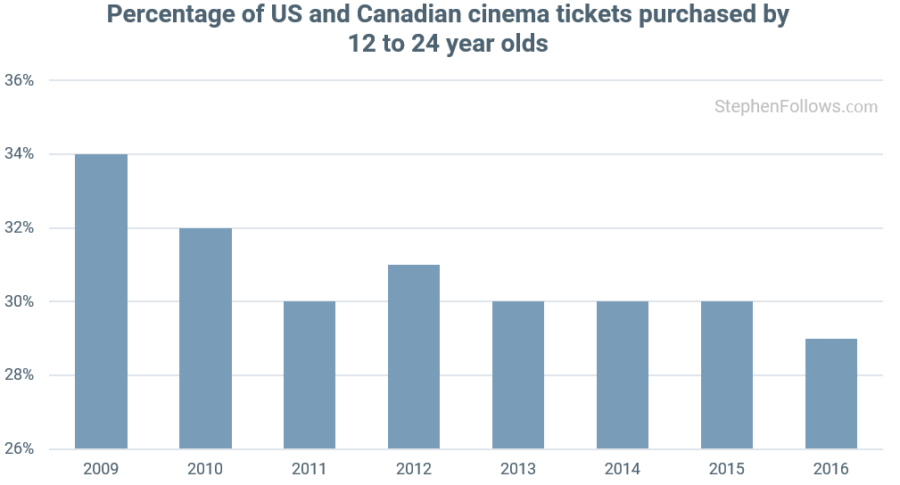
Young people in UK cinemas
To get a sense of the UK picture, we can turn to data from the Cinema Advertising Association’s Film Monitor. Due to different data collection methods and differing definitions of young people, the data between Film Monitor and the MPAA are not directly comparable. Nonetheless, they each show the same trend; that of declining younger cinema audiences.
The timing is slightly different in the UK, with the share of ‘young people’ (defined here as 15 to 24-year-olds) in cinemas increasing in 2010 and 2011. But after that, we see a steady decline from 35% in 2011 to 29% in 2016.
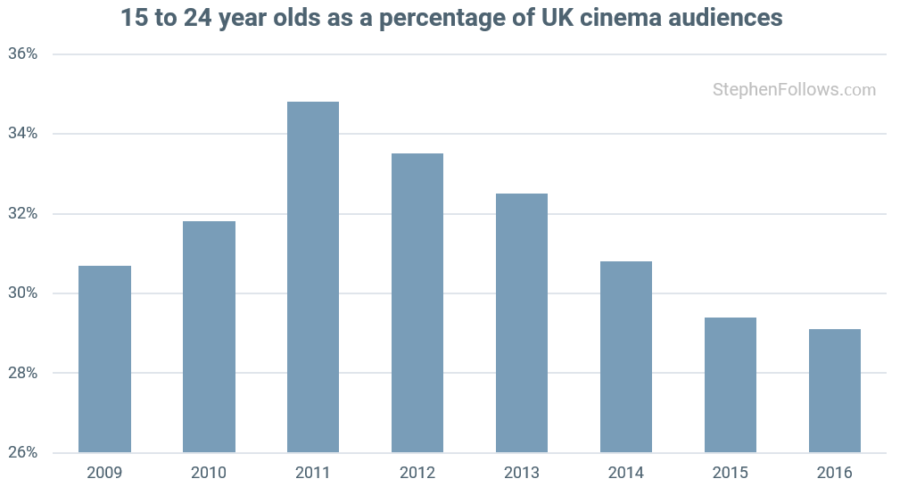
This shift scares cinema owners
Earlier this year, Europa Cinemas published a report entitled New Approaches to Audience Building: A survey of innovation in the Europa Cinemas Network. The study is the largest of its kind and looked at the views of independent cinemas across 26 European countries. Describing challenges for the exhibition sector, the authors wrote:
The clear biggest area of concern is… the failure to connect to younger audiences, which 80% of venues say is a strong concern or the most serious challenge.
This means that European cinema owners are twice as concerned about the dwindling numbers of young cinema-goers than they are about piracy.
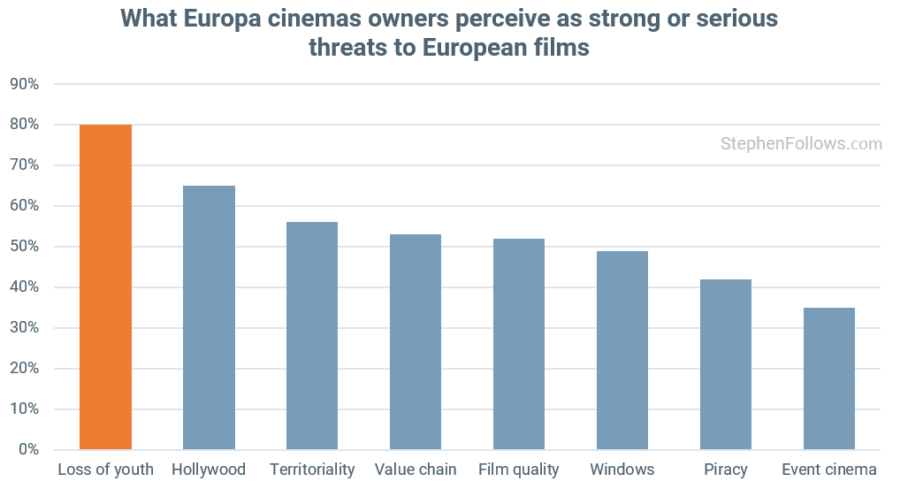
What’s causing the decline?
The cause of the declining young audience is not totally clear. Most people cite streaming and piracy as a major cause, along with a clash between rising cinema ticket prices and ballooning student debt.
However, it should be noted that the recent decline in the UK; seems slightly less alarming if we take a longer view. Young people accounted for 29% of cinemas audiences in 2016, which may seem low compared to recent years, but it’s on a par with representation in the early 2000s.
The lowest years for young people’s cinema attendance were 2004 and 2005, at 26% each.
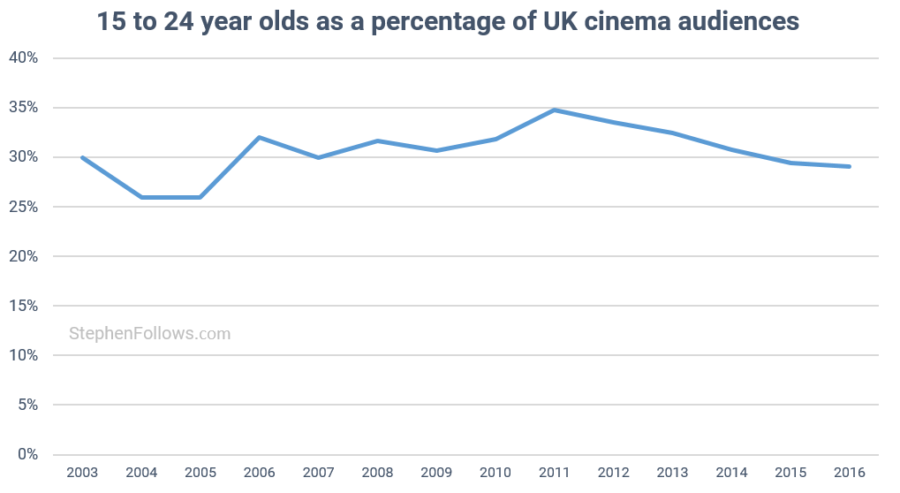
What can cinema owners do to stem the tide?
Advice for cinema owners looking to attract a young audience includes telling them to “use online sources to build urgency to see the movie at a theater” (Nielson), that they should use gifs (but not emojis) in their communication (ICO) or permit texting in some screenings. That last suggestion came from Adam Aros, the boss of AMC cinemas in the US. He said:
We need to reshape our product in some concrete ways so that millennials go to movie theaters with the same degree of intensity as baby boomers went to movie theaters throughout their lives. …When you tell a 22-year-old to turn off the phone, don’t ruin the movie, they hear please cut off your left arm above the elbow. You can’t tell a 22-year-old to turn off their cellphone. That’s not how they live their life.
However, the backlash to this policy change was quick and vociferous, leading to AMC announcing that they were rescinding the change within days.
[tweet 720972338699702272 hide_media=’true’]
Epilogue
I enjoyed the experience of giving a talk to a cinema full of teenagers and I certainly left feeling hopeful about their generation’s interest in film watching and filmmaking. They asked intelligent questions and seemed excited about what was possible for them.
They were most interested in the areas of the film industry that sought out their thoughts and were engaging with them. One of the causes of piracy is a feeling of disconnection from the film industry and therefore antipathy towards the damage piracy can do to jobs, companies or the films. I floated the idea that a £7 cinema ticket wasn’t just a tax on entertainment but a vote for the kind of content they wanted to see more of, which was well received.
Projects like Into film are essential if we are to keep the idea of cinema-going alive for subsequent generations. It is vital to our future that we listen to young people and perform outreach on their terms. It was also rather good fun!

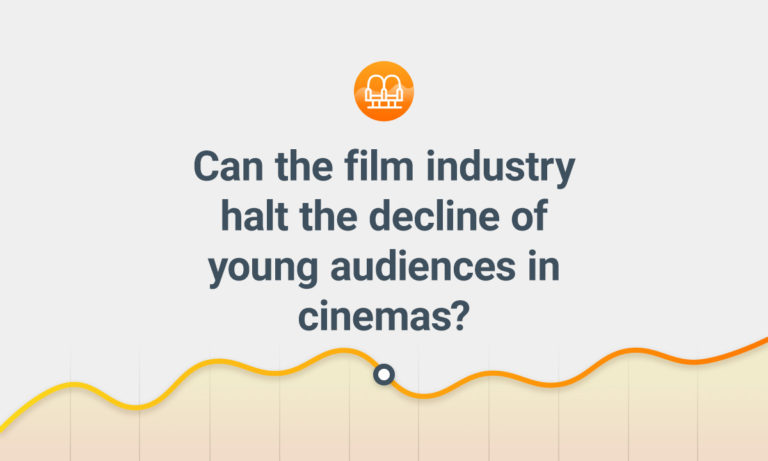
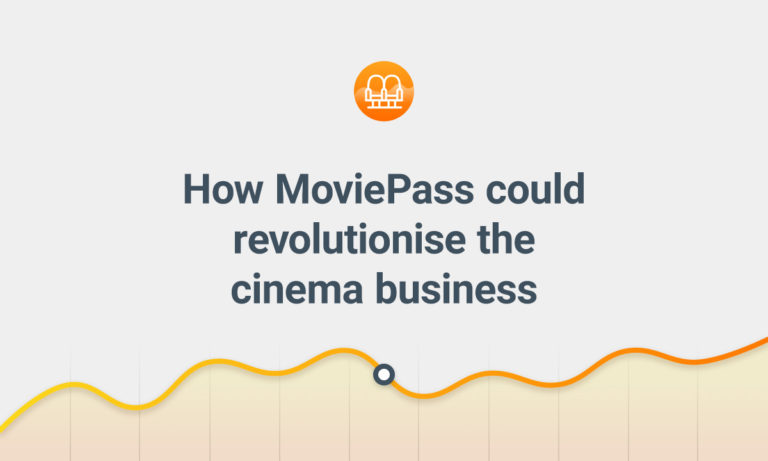
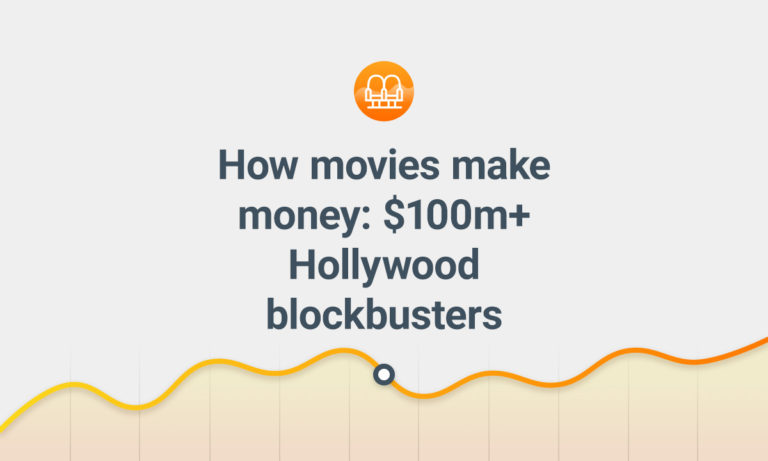

Comments
It’s very concerning that the youth numbers are falling, we should act immediately to counter this trend as the youth are the future.
Perhaps we should promote a Monthly cinema day and give the youth the chance to go to the cinema at a price that is a no brainer to us the parents who pay for it.
Anyway, the major cinema companies in the UK/World should take note and act now.
Vital to have cheap youth film days, really good offers for families to draw them in as children and publicity stunts so that cinemas are talked about in the local communities.
No business wants to reduce prices but it’s the ticket prices.
Before you have your own disposable income you’re relying on your parents. With wages having been stagnant for nearly a 10 year period (the first time since the 1800s!) people have less disposable income. A £7 Netflix subscription offers way more value for parents who can then share it out with their spouse and up to 3 kids.
If you want to see the latest blockbuster – wait 3 months and rent it for between £4-10 for your entire family.
With the home cinema experience (cheap huge and great quality TV’s – OLED, HDR etc.) getting better this will likely continue. I’m a cinema nerd but there’s only one theatre that improves on the experience I get at home – that’s the IMAX Laser
My local cinema – the Empire in Walthamstow – seems to have a much younger generation attending than the other cinemas I go to. It is by far the cheapest Cinema in London with £3.95 tickets on Tuesdays. They do specific family screenings too.
Thanks for sharing this post! It is very nice to read this articles and those replies! It makes me feel there are lots more people concern about cinema than I image.
The major cinema always present the major movies(Hollywood) which is much easier to find online(or just need to wait for a bit), although its kind of movies focus on the youth market.
If all the cinema is fighting with streaming/online contents, perhaps cinemas need to do something fun/ interact/ social event in cinema which no one can do/ find it online. Like film festival, it has panels that people can offer their ideas, it does attract lots young people join the event who never been to cinema.
That is an awfully expensive (prohibitively so) proposal for any mainstream movie. Yo simply can’t have panels at multiplexes that want (and need) to get people out of the theater so a new audience can come in in 15 minutes. IT would add to the cost while taking away at least one showing a night.
Another major issue is that there is a trend for distributors to, um, discourage cinemas setting up close to each other as it would likely end up in price wars/cheaper tickets. (Something they do not want.)
The problem here is that the cinema industry is stuck in old ways in that they still think they are a scarce resource to the young.. While young have entertainment devices that can watch any film in seconds in their pocket. Or at home on HDR TV sets that achieve better images than are possible in cinema (Ever).
This has led to film policies and restricted access to smaller more distributed cinemas. This sand in the face of the younger generation has taught them to look elsewhere for entertainment, or to simply pirate, as they know how.
The young have a short attention span. I work with a lot of regional locations, and I can tell you, the treatment they get. Second run as they are only a single screen etc. Is killing those regional cinemas as by the time they get content, it is too late, the young have moved on or obtained the content via alternate means.
Add the shorter windows that are happening, and we are teaching the young generation that cinema, and the way it is run today, is not a commercial concern to them. It is killing the culture of cinema.
This is the danger, and a major issue the Studios are overlooking by allowing traditional business practices to continue in a world that is changing.
Policy and restricted access needs to go, and a floor on ticket prices needs to come (As Disney has already implemented) We need to get films to the young as fast as possible and were they are. Not force them to come to us, and make them wait for content.
Look at the stats on piracy before Netflix came along.
Convenience is king, and cinema culture needs to take this on board or pay a heavy price.
Reading “The Hollywood Economist: The Hidden Financial Reality Behind the Movies” by Edward Jay Epstein, I think that practice is not common anymore
Skyrocketing ticket prices. Annoying audience members yakking away or with their phones lighting up the dark. Far more competition for their entertainment time. And home theater set ups that deliver a much closer experience to a theater than ever before. (And in some cases, possibly even BETTER than some multi-plexes. Not hard to see why.
Sorry, but that idea of texting on cinemas is horrible. The spirit of cinema is concentration, if this disgusting generation cannot concentrate, their problem. If cinema must to die, at least let him die with dignity.